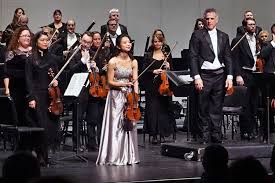Review: Valentine’s Night at the Berlin Philharmonic
OrchestrasOur roaming critic Susan Hall was there:
Valentine’s Day at the Berlin Philharmonie and the hall is packed with celebrants.The first work offered is Brahms’ Tragic Overture, which is on every list of music you should listen to if you hate Valentine’s Day. One origin story suggests why. St.Valentine was beheaded for encouraging the marriage of soldiers thought to be weakened in battle by lovemaking. This Overture, according to the composer, is designed for crying your eyes out. We are in Berlin and the conductor is Kirill Petrenko.
It is a revelatory evening, in which the common and uncommon weave together in musical poems. So too folk references and the ‘glossing’ of past masters. Brahms had an idea about culture. He wanted the concert hall to be not a museum performing historic works, but a home for both sophisticated and untutored listeners.
Petrenko showed us a sad Brahms, but more importantly a pleasure machine. You don’t have to know sonata form to enjoy the two stern chords Petrenko draws forth at the outset. As the orchestra plays the austere, arching main theme, low strings and woodwinds stand out. Gloomy trombones and tuba hang over quivering strings. The violins give us tranquil respite, but storms loom again suggesting heroic struggles.
Petrenko reveals interior phrases of solo instruments and small instrument groups. They stand out in shaped delivery, in dynamics and also clipped entrances and exits.
A love letter, Violin Concerto No. 1 by Karol Szymanowski, followed. The ‘letter’ was given a gossamer performance by Lisa Batiashvili swirling in passionate purple sequins. She captures radical tonality in rapid shifts, giving the impression of a highly chromatic and changing logic. The violin is hypnotic; the orchestra, more controlled. Musical phrases are often made up of little particles, like a mosaic. Melody is entirely unconventional and the harmonies of the orchestra are a whirlpool of dissonance.
Szymanowski is very apt for a Berlin Valentine Day. This city is famous for accepting people as they are. The young man who inspired this music would desert the composer for Serge Diaghilev, and then Cole Porter. The twists and turns of the passionate work sound youthful.
Richard Strauss’ Symphonia Domestica concluded the program. It was composed in Berlin when Strauss was appointed chief conductor of the Royal Court Opera. Strauss was happy in his home life, but always able to look at it square on. He’d made too much of himself in the Ein Heldenleben tone poem and wanted to show how earthly he could be. The performance of the work in a New York department store scandalized the music world.
Now, in the Philharmonie, Petrenko and the orchestra erupt as a large family gathering in the opening scene and then lead us through the portraits of a husband, in dreamy, surly and fiery themes for each of his moods, a graceful and lively wife and a joyful child at play. We get to peek into passionate love making. The work ends with the chaotic awakening of a new day and the clash of cymbals. Petrenko presents an overarching view of Symphonia Domestica, as well as magical details. Each character is brought forward as they step into the music and mix with each other.
This celebration of the Struass’ fifty-five year marriage concluded Valentine’s Day in Berlin.
Susan Hall






Comments